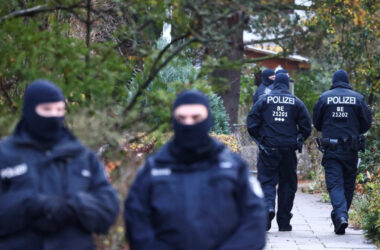With just over two weeks until the Bundestag elections, German politicians went head-to-head in a fiery ZDF debate, tackling migration, the economy, and energy policy.
The 90-minute showdown featured six party representatives: Tino Chrupalla (AfD), Felix Banaszak (Greens), Jan van Aken (The Left), Alexander Dobrindt (CSU), Christian Lindner (FDP), and Sahra Wagenknecht (BSW). Meanwhile, Chancellor Olaf Scholz (SPD) and CDU leader Friedrich Merz will face off separately on February 19, with AfD co-leader Alice Weidel notably excluded from the main debates despite her party polling ahead of the SPD.
Migration: A Nation Divided
Tensions flared when AfD’s Chrupalla and CSU’s Dobrindt warned that unchecked immigration was overwhelming local governments. Van Aken countered, claiming Germany could easily handle a million refugees annually, blaming funding shortages—not migration itself—for municipal struggles. Wagenknecht, however, was having none of it. “Only those living in privileged areas can deny the strain,” she shot back, pressing van Aken on when he last set foot in a poor district.
Earlier that day, André Berghegger of the German Association of Cities and Municipalities (DStGB) had issued a stark warning: public services and city finances were at a breaking point due to record asylum numbers. During the debate, Chrupalla accused migrants of exploiting Germany’s welfare system, a claim ZDF fact-checkers later confirmed—nearly half of asylum seekers receive state benefits.
Dobrindt dismissed The Left’s pro-migration stance as sheer denial. “Rarely do you see such a refusal to face reality,” he scoffed.
Economy and Energy: A Battle Over Priorities
As the debate shifted to economic issues, AfD and BSW aligned on the need to restore cheap Russian gas, blaming sanctions for Germany’s financial woes. Wagenknecht insisted the measures hurt Germany more than Moscow, while Chrupalla pledged a return to coal, nuclear, and Russian energy. Dobrindt accused them of siding with Putin over the EU, but both stood firm, arguing they were prioritizing German citizens.
Lindner (FDP) called for slashing bureaucracy and ending wealth redistribution, while The Left and BSW pushed for rent controls and seizing properties from major landlords—proposals Lindner dismissed as relics of the past.
Election Outlook: CDU/CSU Leads, AfD Surges, FDP in Trouble
As the debate wrapped up, candidates outlined their top priorities: Lindner vowed to kickstart economic recovery, Wagenknecht promised a foreign policy shift to keep Germany out of global conflicts, and van Aken pushed for rent controls and VAT cuts on food. Chrupalla and Dobrindt focused on tackling both migration and economic issues.
Current polls put CDU/CSU in the lead but short of a governing majority, meaning coalition talks will be inevitable. AfD continues to gain ground, projected to secure around 21–25% of the vote. Meanwhile, the SPD and FDP face major losses, with the FDP at risk of falling below the 5% threshold needed to remain in parliament.
With stakes this high, Germany’s political landscape could be in for a dramatic shake-up on election day.




